Yuugai Muzai Gangu
A collection of stories from Shino Ura. I've been hooked on their work since I first read this anthology. It starts with a tale about a high schooler being sent on an assignment to investigate a museum of toys that are "harmful but not unprohibited," to a story about someone frozen in a single second for hundreds of years, then a story about mermaid goldfish, and finishing with a story about how with water you can see a sort of reflection of the dead.
Meaty!
And due to how each of these stories is its own oneshot that could be talked about for pages. I'm going to do that. After lightly reviewing the whole of it first.
Shino Uras usual writings have a habit of going to the spaces that could have something lonely in them. Perhaps an existential loneliness or an individual loneliness, but there's always a void around the subjects. Toys forgotten and stashed away; the wanderings of someone who takes their time to write in every page of every book that exists because they have all the time within a second by themselves; the seeking existence of the goldfish mermaid, forever orbiting another; the want to see a loved one once a year after they've passed. I would consider their work speculative fiction and outside of reading manga I usually read science fiction anthologies, and so it's no suprise that I like this anthology so much.
Toys Harmful but Unprohibited

The first in this anthology is the one about fantastical toys that had to be removed from the consumer market. You follow Sakamoto, a student doing an interview there, along with the museums guide, Yanagihara, through each of them, and Shino Ura plays with all sorts of concepts.
From glasses that let you see five seconds ahead of time (which make walking rather hard) and a toy that you see as what you'd like most. This is where the art style and framing starts to play with you. With some of the more higher concept toys the panels and art warp to reflect the perceptions, or perhaps multiple that the toys occupy. With the toy that you see what you'd most like the pages double, one with each of the characters two perceptions of the toy, and then suddenly with the next, diagrams are popping up to play with alternate timelines.
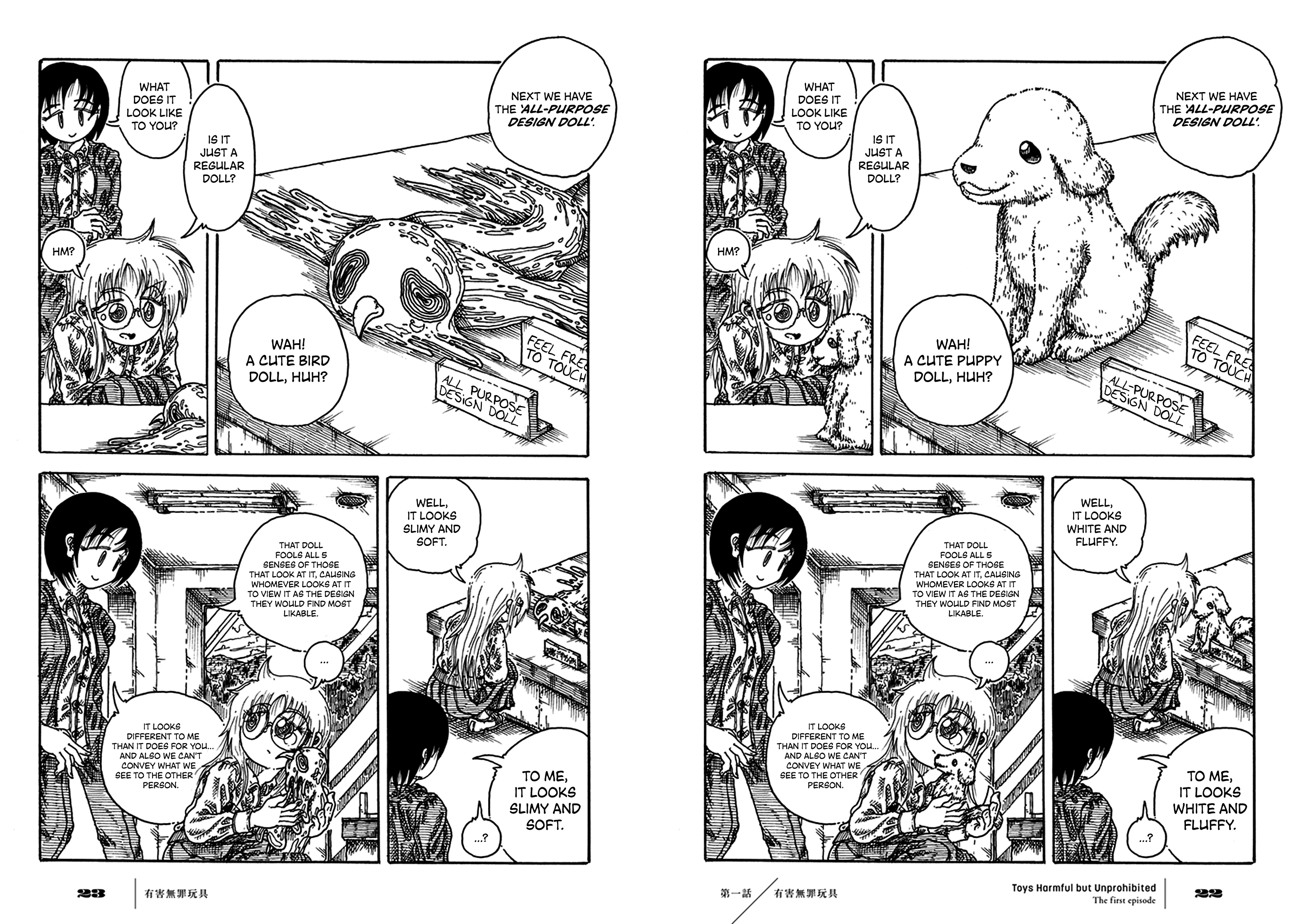
There's a lot of classic sci-fi concepts, most of which would be a good Star Trek episode on their own, but the mixing of them and the fun that the author has in showing them to you makes 'Toys Harmful but Unprohibited' a good readthrough. Every cool device in sci-fi has been done, so the creativity in how you do it is where concepts shine, and this is an excellent example.
I think the most key part of this story is that a lot of the toys and the interactions with them are somewhat cut off. While Sakamoto is contimplating whether to draw on or look at the future drawing predictor and the full causations are explained the story moves on. The characters cut to another toy. It never gives you the immediate satisfaction of a lot of the concepts. The pill of disassociation is given at the beginning, and by the time you get back to it you've gone across so many meaty topics you go "Oh! Oh yeah..." when it comes back up.
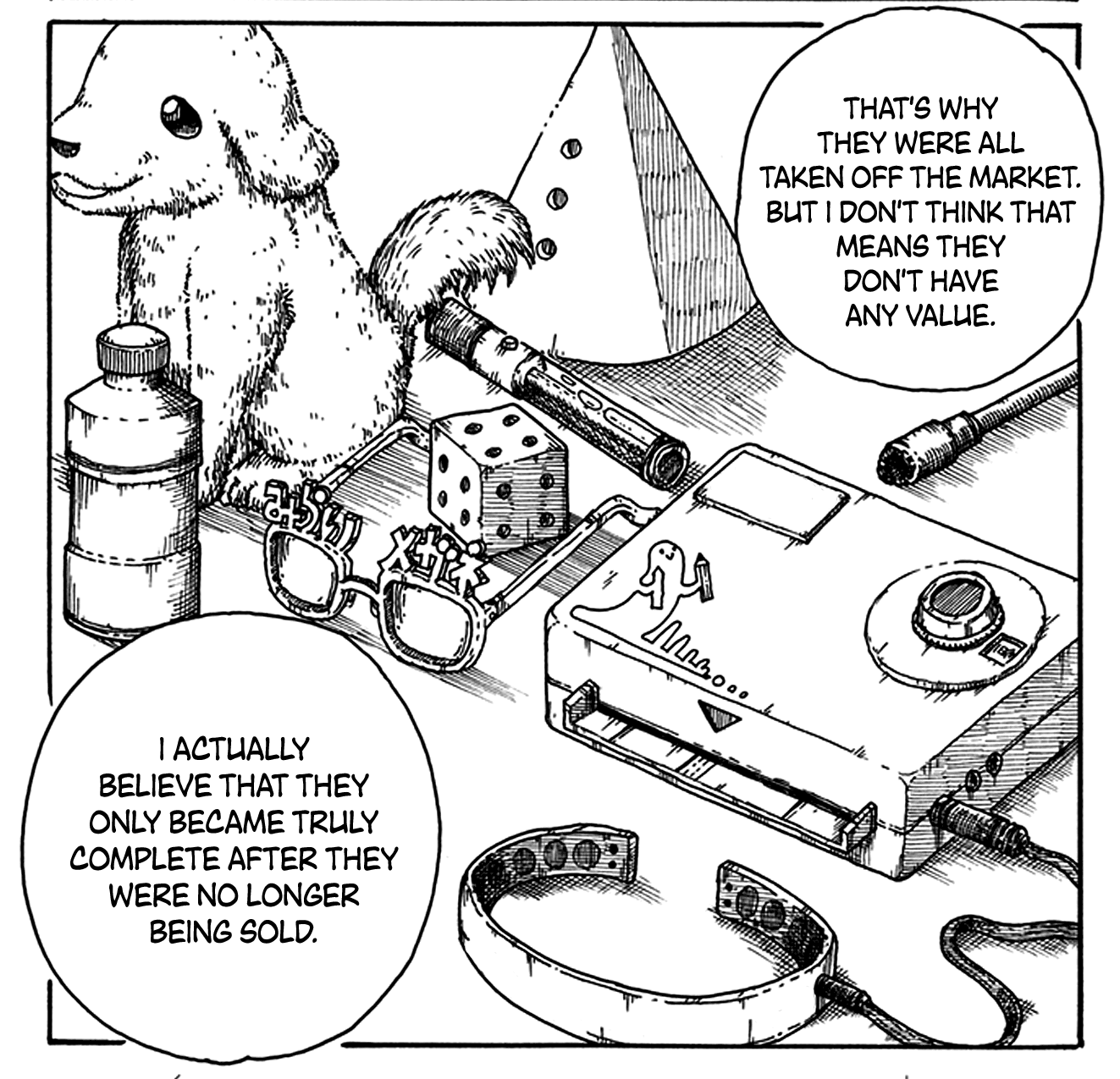
The level of understanding of when to go into the description of the toys, or to set it up for later is probably why I like Shino Ura so much when it comes to their speculative writing.
Imaginary Time Recreation

Thousands and thousands of years, frozen in time. It's again a very simple sci-fi concept, and one that is filled with creative uses for it. A woman, Touko walks by herself forever, occasionally making conversation with either her imagination or the people stuck in that time.
I don't have much to say on the structure here, it's fairly straightforward, and the story wears its' themes on its sleeve. It would be really fucked up if you lived forever in a second.
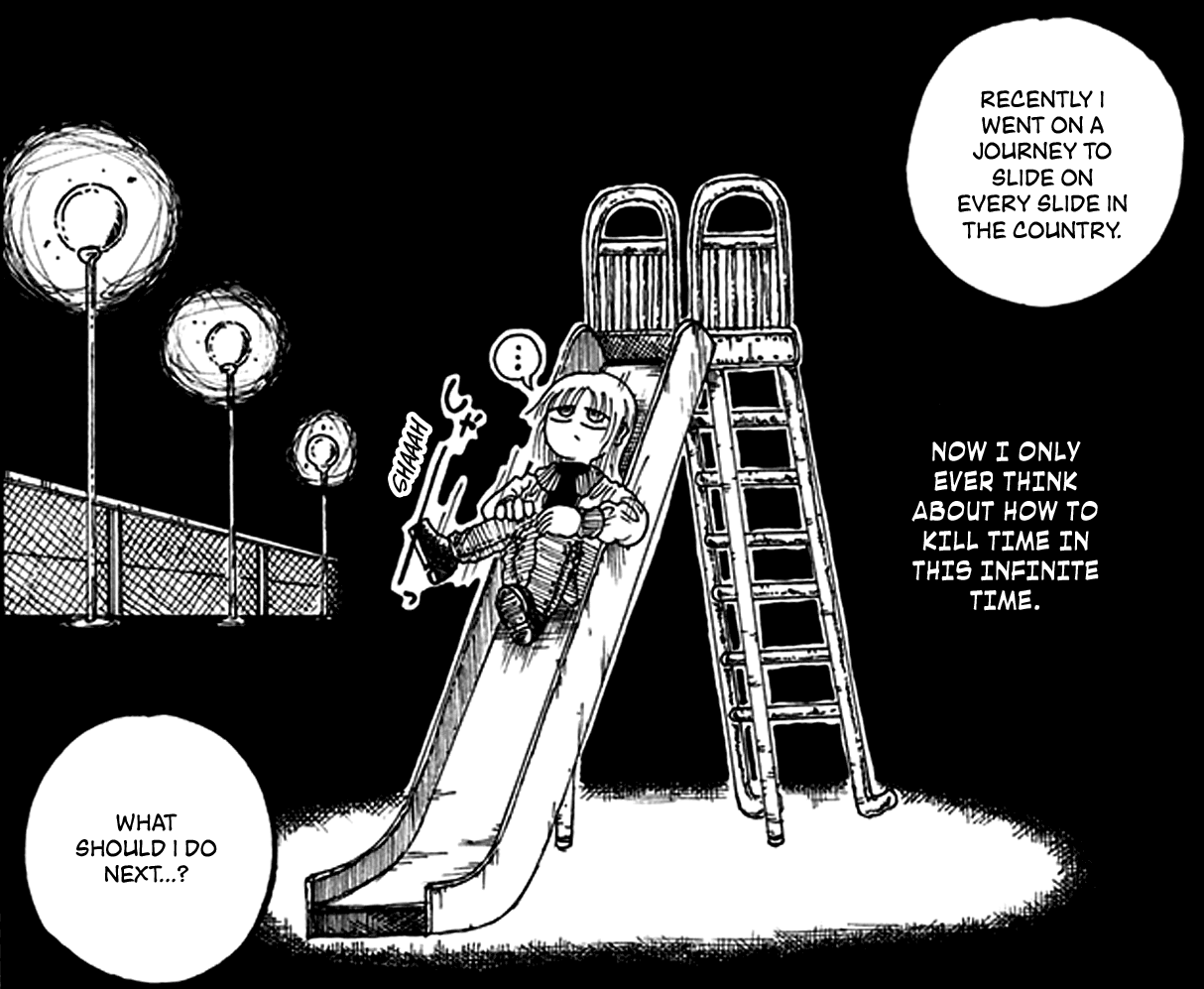
It's a story that aims for a bit of thought but also leans into a more emotional core, clinical but letting you into that sweet spot. You see a woman who has become bored and often cold to the people she finds and their situations. She does not have an aim in this world. She comes up with diagrams for a working time machine, then tears out the sheets to use as paper airplanes a couple thousand years later. She cares not for the situations of the abandoned or in strife that she encounters. But how could she?
She's at a point where anything that could possibly be happening in the moments after time continues is irrelevant. And how could it be relevant? She's been worn down over and over, not even aware of how far, how could she even consider anything outside of her stopped time?
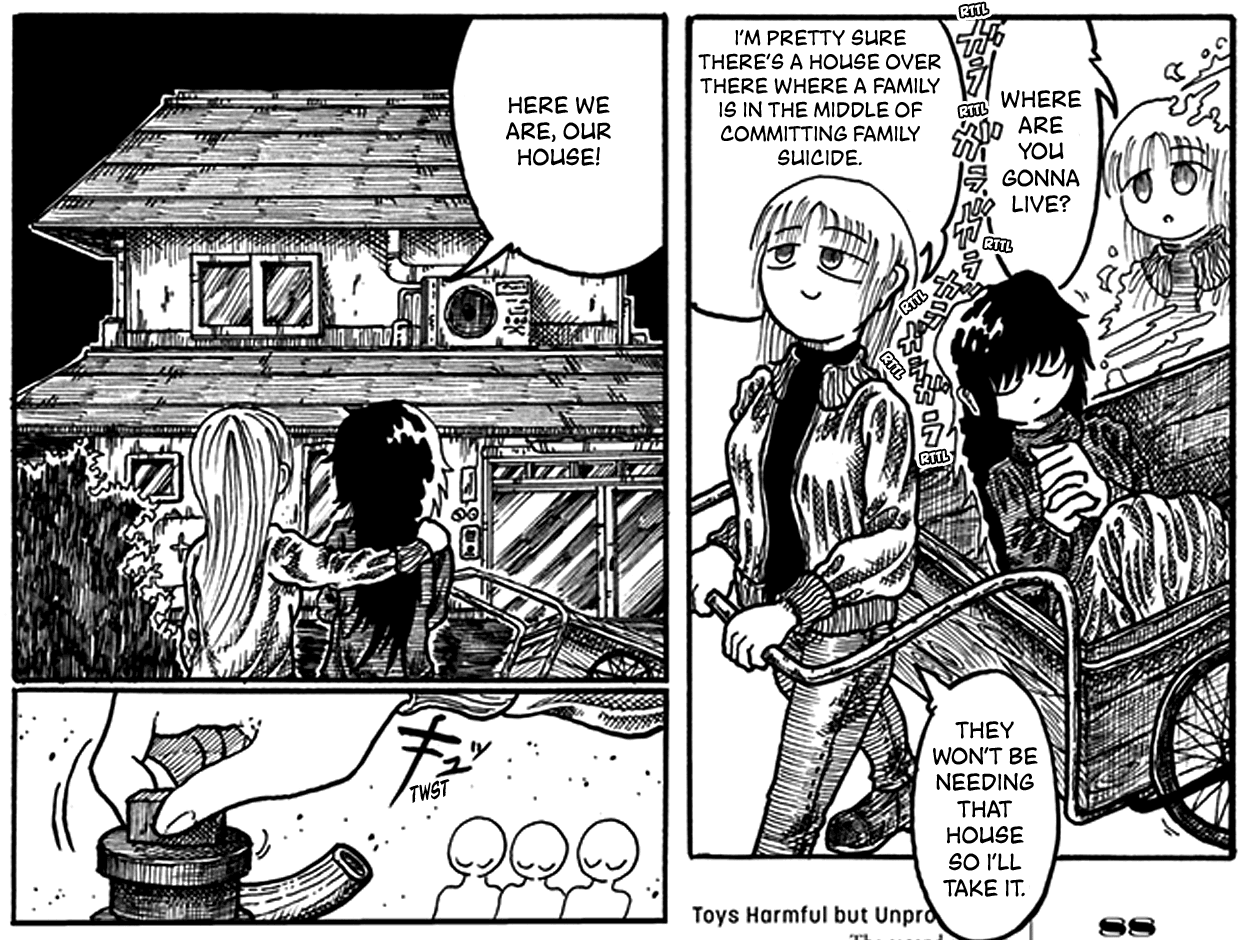
When her figment poses a question of "what will happen when all of this starts moving?" she does not know, nor care. You understand that she is living at a different standard. But then the teardrops at the highway appear. A glimpse into her past. Once she was upset by it all. Once she cried for everything in the world.
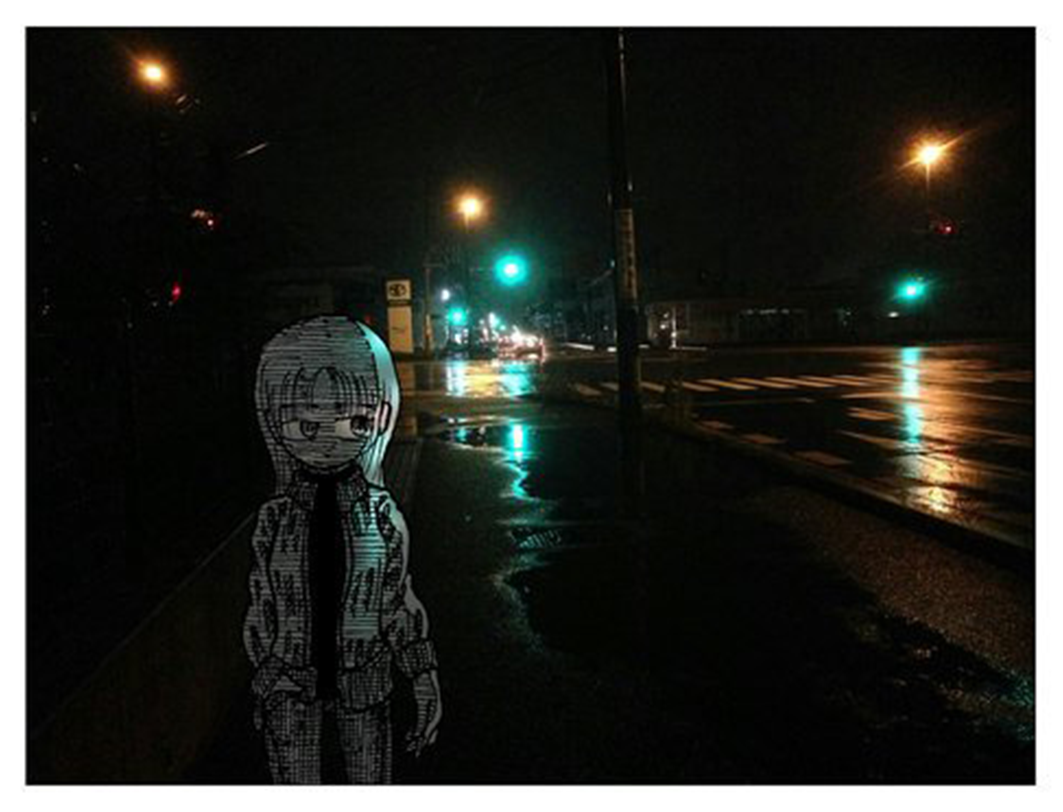
The Goldfish Mermaid is a Mermaid Goldfish
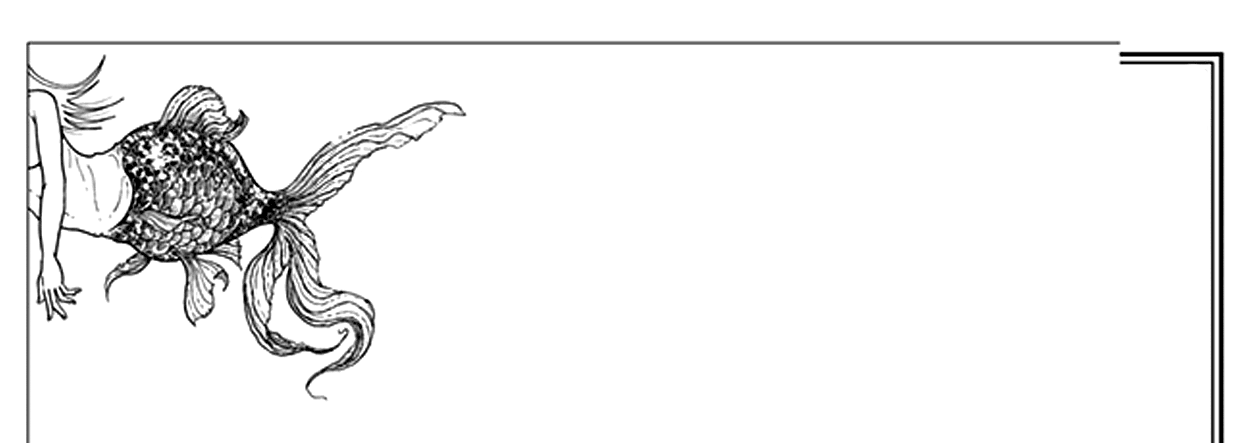
This story sets three rules. Mermaid Goldfishes put rocks in their mouth and spit them out, but are not aware that they do so. They cannot die or feel pain. They cannot perceive anything except vague shapes and while they set someone or something as an 'owner' to orbit, they cannot see them outside of the space that they occupy. Such is the life of a goldfish mermaid.
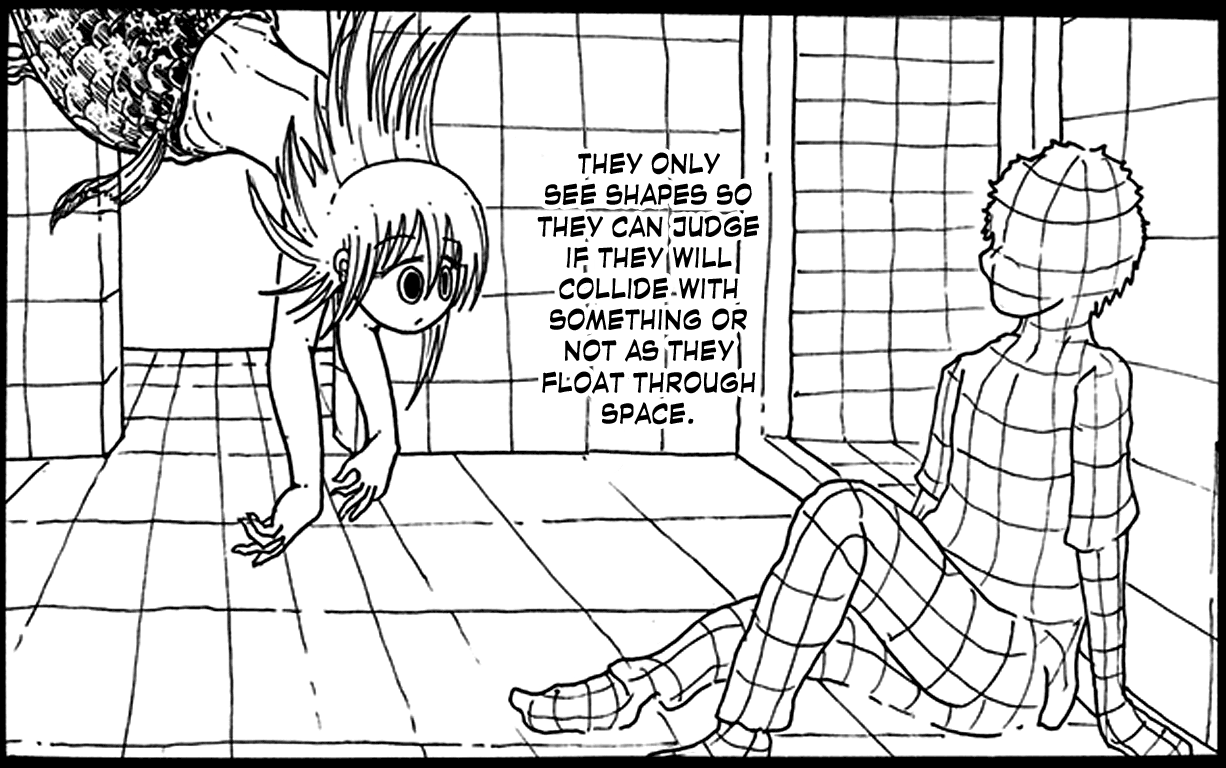
An existence like this, one of non-cognisant actions repeated on and on forever (and truly taken to it's limits of consideration) makes you wonder, is it even considered being alive? It proposes a life of true nul value. One unable to even process that it even is. And why not? It becomes a background of humanity to project upon it's own values of life. From being a sign of bad times to come, to a curiosity to be clinically investigated, to being a god to follow and worship.
In a way it takes Monty Pythons "A Life of Brian", with its comedic way of how christianity comes about, and elevates it further, understanding not only how humanity conceives of a religon, but of urban legends, myths, how we interrogate worth societally.
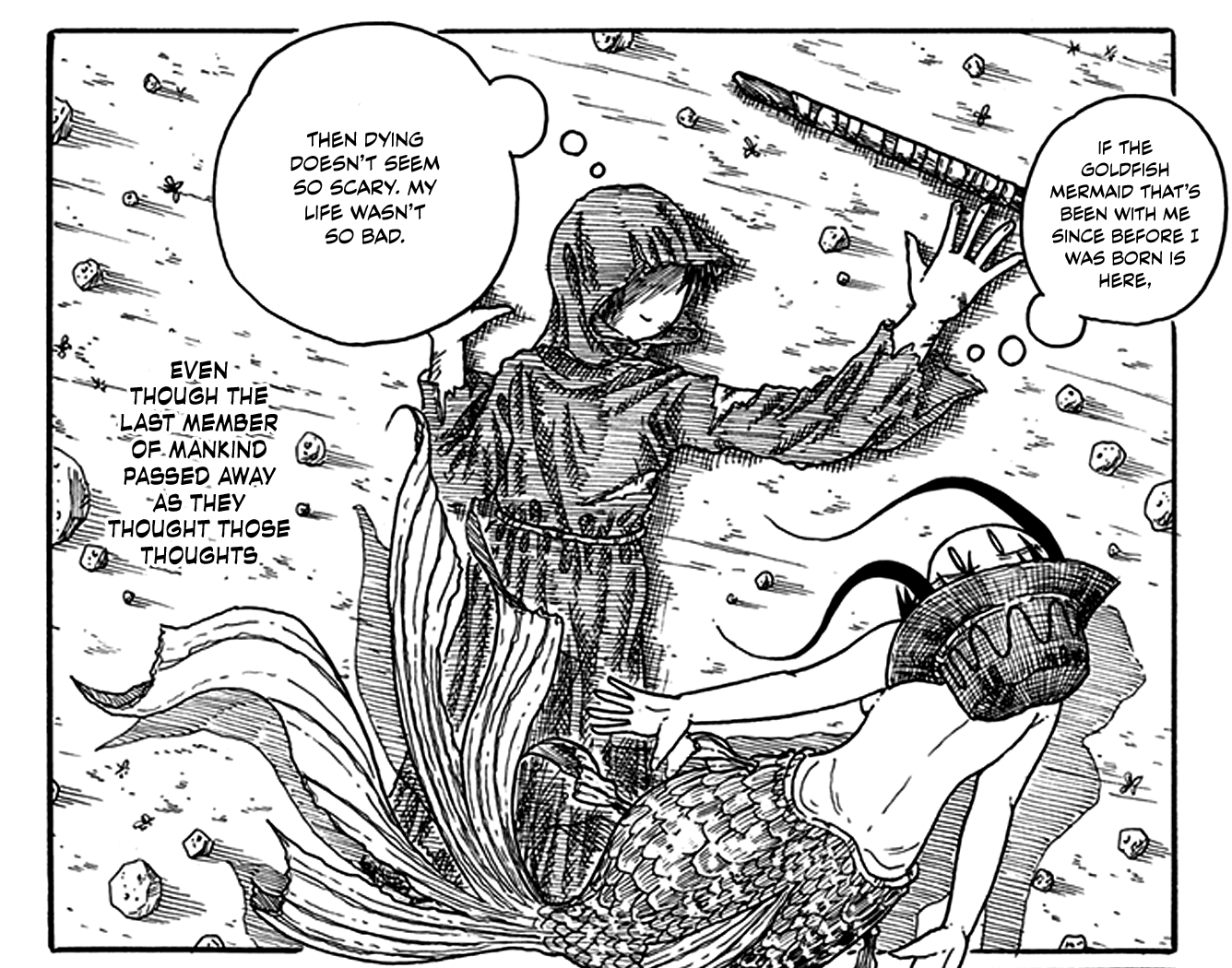
This one is also kinda fun because it brings in concepts from their other anthologies, like the different gods or characters. While the god of paths is more about exploring boths relation in these constructs, some of the characters add depth into how other perspectives see them. It includes the Harmful toys wopamn using her abilities to help people trying to understand the mermaid, and even the woman from Imaginary Time Recreation is mentioned. It's a good way to bring you to think about how the different characters, or different concepts would coexist together, and drives up your understanding of how things work in this kind of world. A very clever way to make your audience begin understand the world building, and to elevate the goldfish mermaid construct.
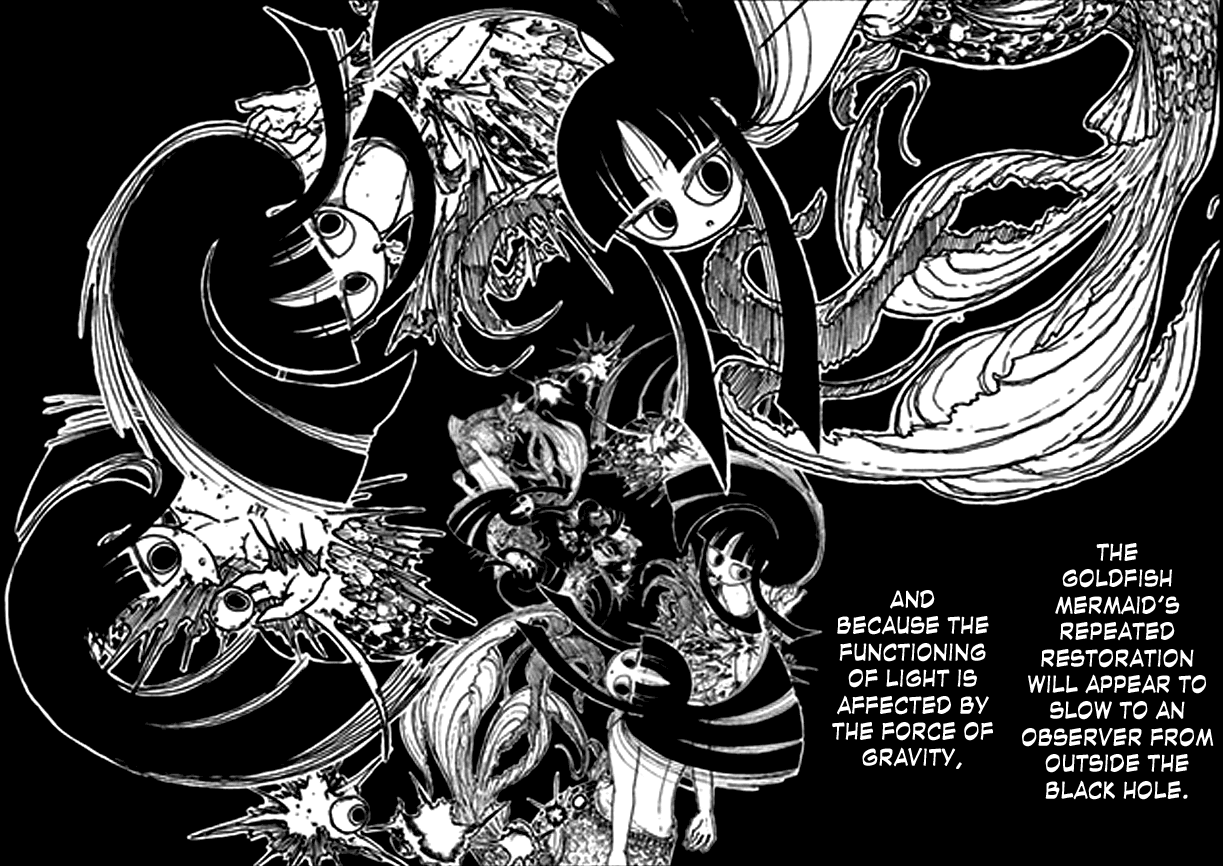
The Goldfish Mermaid, the only constant in the universe, something that can experience everything in it's entirety yet cannot. Perhaps that is what we strive for, or fight against becoming.
To the Tray, Spilt Water. To the Tray, Not Returning.
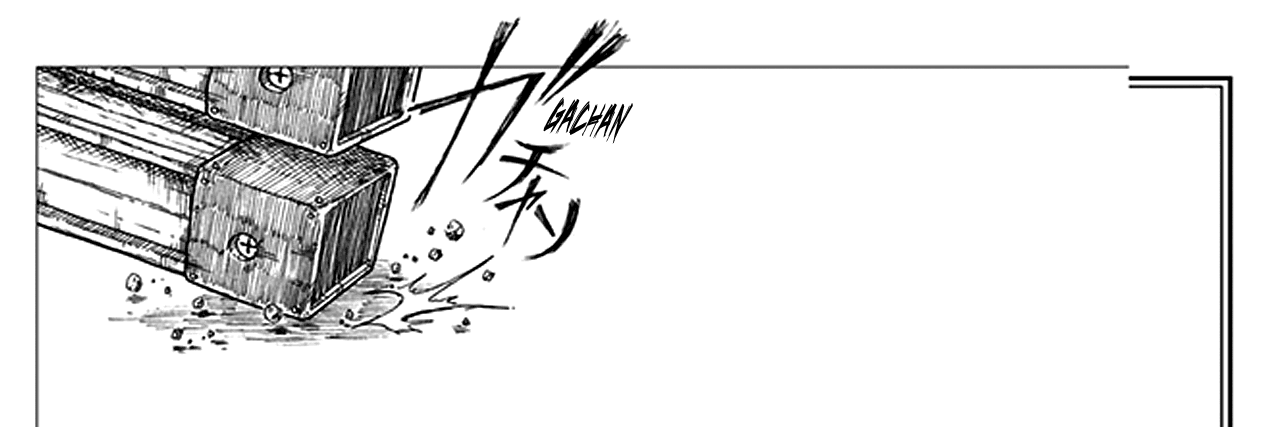
This hinges around the concept of 'death water'. When you die you apply the death water and if you use it on Obon in the same place they died they come back as a kind of spirit. Kind of a neat idea, very similar to Shino Uras other concept of the face stealing cats and such. This one (like the cat story) is a bit more emotional than Mermaid Goldfish. While it's an exploration on the limits on such a concept, it's more about the woman who died.
She died on the second floor of a building that doesn't exist anymore so the protagonist has to climb a ladder to see her every year on Obon. It was intentional, making her climb the ladder to a second floor that doesn't exist anymore. The character describes how she's going to go 1000 years in the future to the water ghost of the woman, and that she wishes for the woman to wait to pass on so she can see her in that future.

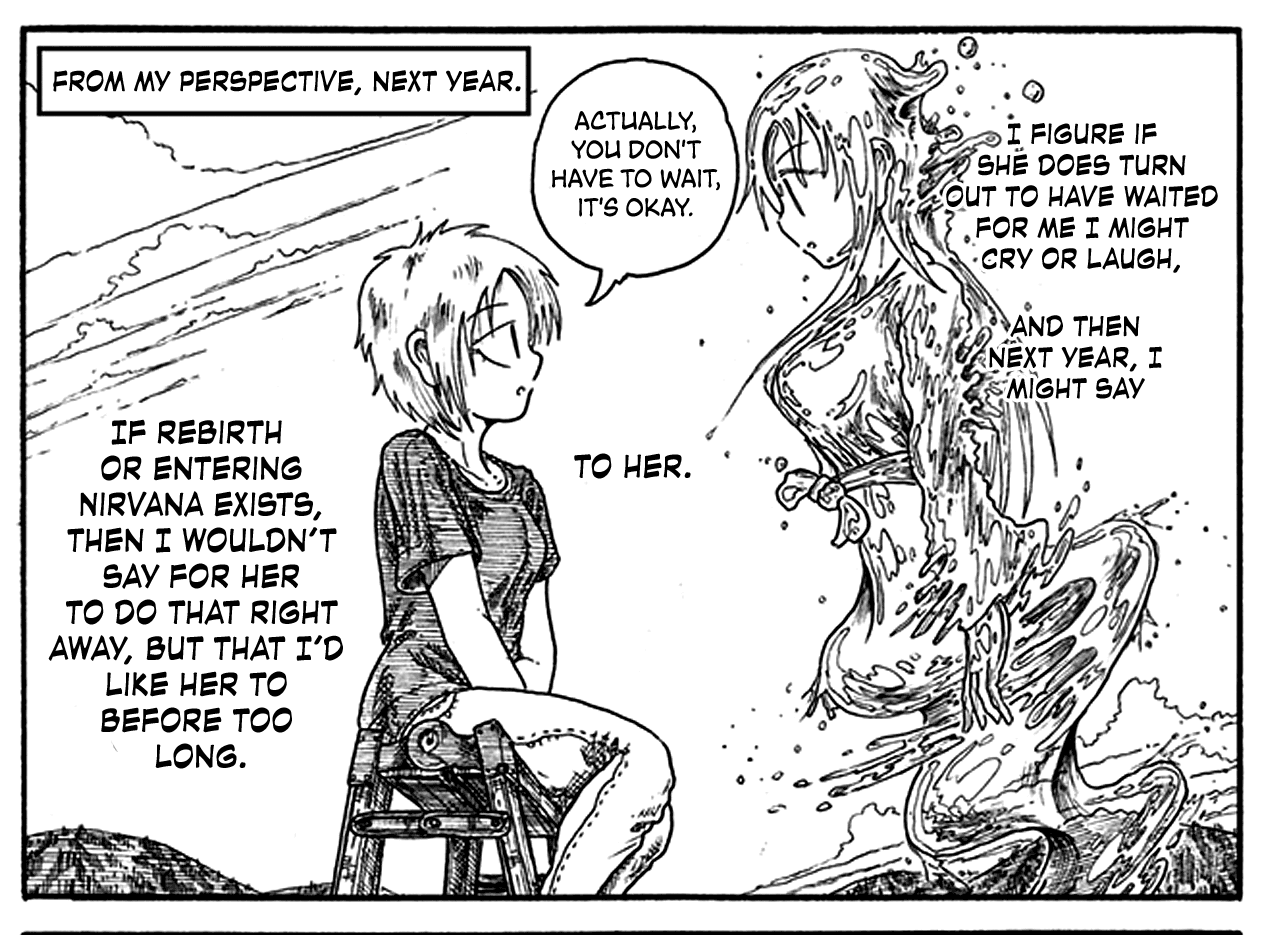
As she leaves into the future, she debates if she should go back next year(Present) to tell the dead woman not to show up if she can pass on, before considering her contrarian nature in life. No matter what she said, as long as the woman knew she was going to be there she would be there. In life she would wear sweaters in the summer, stayed in when it was a good day to go out. She would do exactly what she wanted, and both knew they would meet again in 1000 years.
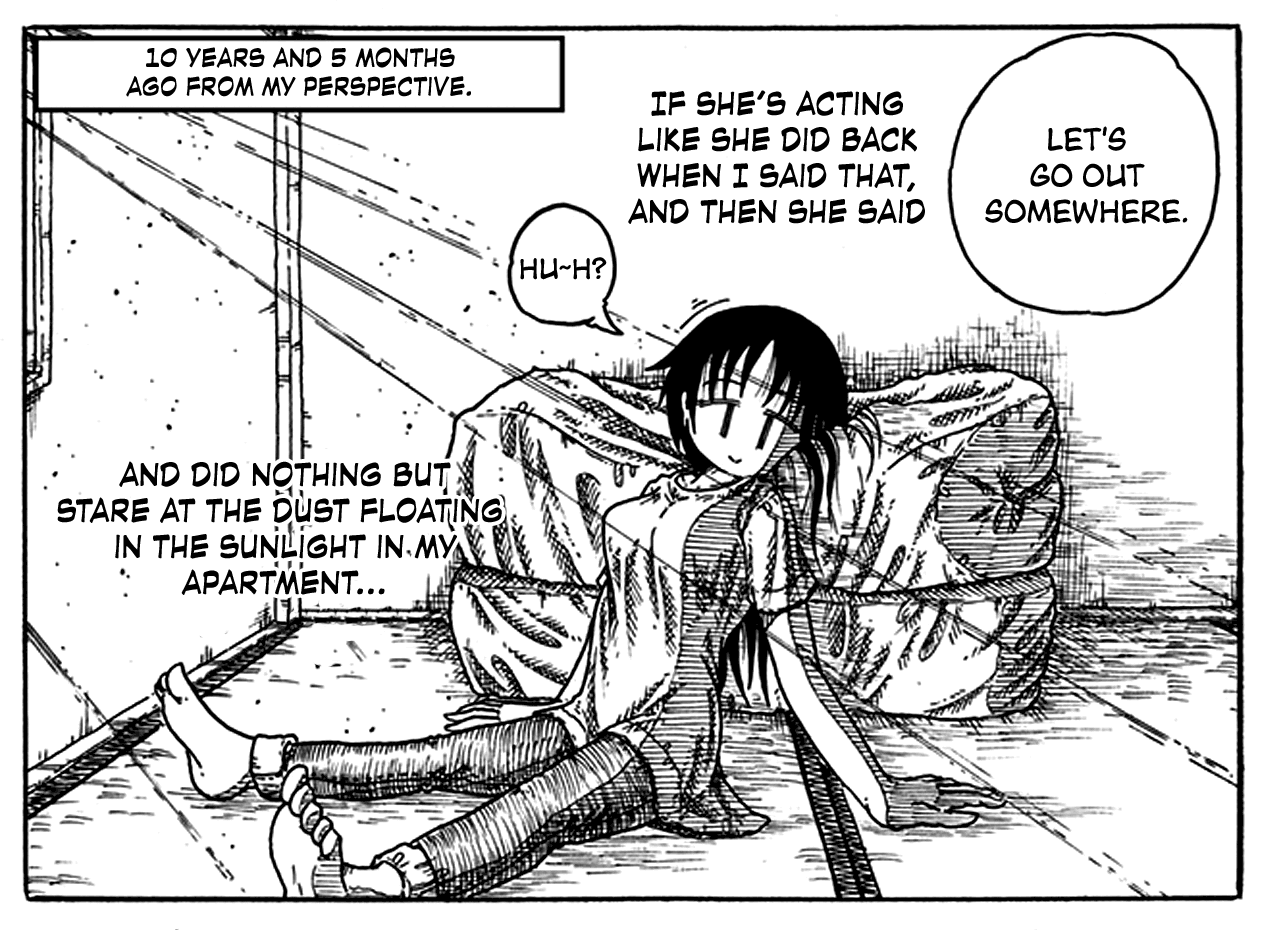
Being able to reflect (haha water thats probably the point) back on a loved one in such a understanding way... It's kind of a wonderful look into someone who you love who has passed on, and how you can kind of count on them.
I think its very succinct and wonderful!

All of these were originally published on the authors webpage before being published as a grouped together anthology. I think it's a well balanced collection, each are well paced, and the authors notes at the end are fun! I would reccommend reading their other works as well, their stuff with gods is really next level.
Each of the characters have something that ends up being the other(or at least once did), the thing that frees them from being truly alone. The toys left in their museum have a caretaker, the dead accompany you in your memories(and sometimes literally). Even the Golfish Mermaids need something to orbit. The woman in time is kind of the pinnacle, everything she does and is is defined by the loneliness she has been left with, and yet she can find a sort of companionship with herself and those frozen around her.

The topics in each of these appeals to me greatly. I think most people it will appeal to as well I guess, but "To the Tray, Spilt Water. To the Tray, Not Returning." is probably my favorite, followed up closely with Goldfish Mermaid. I'm not saying I dislike or even feel that they are 'mid' by any standard btw, both of these types of stories just end up checking all my boxes haha. Both have well thought out systems and explore a lot of our futures and pasts in nice ways. I didn't even mention all the future stuff in Spilt Water. Love it.
I will also admit that the topic of loss is always gonna get me, especially the kinds of loss presented in these two stories. Goldfish Mermaid being lumped here might give you pause, but it's more about watching all these people interact and attach or not attach to the golfish mermaid and watching them all go with time. Auuugh that gets me too. I guess "Imaginary Time Recreation" also deals with its own kind of loss and I will admit I think of that one often as well.
Part of sci-fi is enjoying moments in your own life reminding you of speculative visions or concepts you've read before. Hopefully you read one of these and later end up having to explain it to someone when you're reminded of it, it's so fun. I do it all the time, it's great for me. IDK what my friends think though. Oh well.
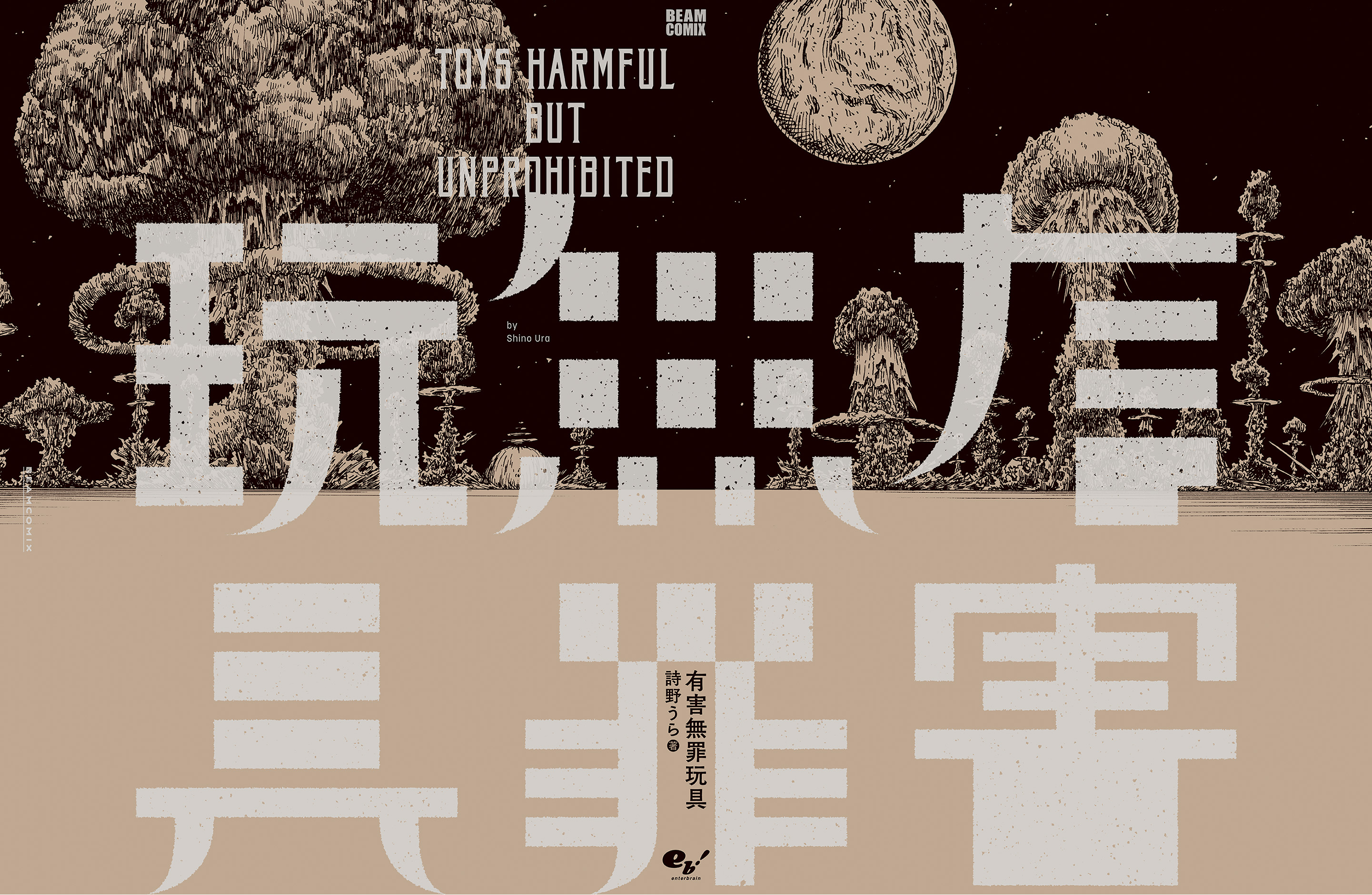
As a side note, as my first review into something I'm putting as 'not yuri' the author frequently has female mcs along with other female characters in close relationships -most awkward wording ever. I don't care much to speculate usually in the genre, and seeing how it is another culture, but away in some corner of my mind I'd like to think somehow, this too is yuri. Always trying not to be weird about yuri but whatever. such is life.